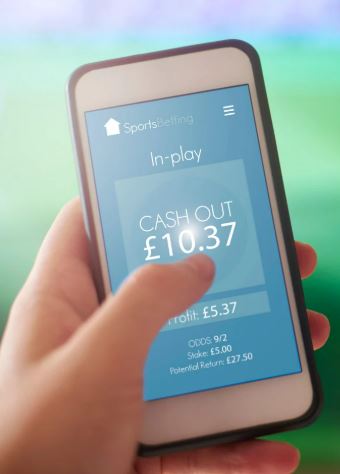How Do Bookmakers Calculate Cash Out Amounts?
The cash out feature has become a common part of online sports betting, allowing bettors to settle a wager before an event has concluded. While many users take advantage of this option, few understand how the amounts offered are determined.
This blog post explores how bookmakers calculate cash out amounts, what influences these figures, and why they can change so rapidly. It also looks at how partial cash outs work, the key factors that affect the value of an offer, and the main advantages and disadvantages of using this feature.
Read on to learn more.
What Does Cash Out Mean in Sports Betting?

Cash out is a feature offered by many bookmakers that allows players to settle a bet before the event they have bet on has finished. This means a player may receive a return which could be less, or sometimes more, than their original potential win, depending on how the event is progressing.
By choosing to cash out, a player accepts the offer and closes their bet early. The outcome of the sports event after this point does not affect the amount they receive.
The main reason someone might use cash out is to secure a certain amount rather than waiting for the final result. It may also be used to reduce possible losses on a particular bet.
This feature is optional and does not need to be used. So, how do bookmakers put a figure on it in the first place?
How Is Cash Out Calculated by Bookmakers?
Bookmakers use live odds and data to calculate cash out amounts. The value reflects the current likelihood of the bet winning at that specific moment, based on in-play performance and updated market prices.
To arrive at an offer, the model looks at the original stake and the latest odds for all relevant outcomes. In simple terms, the fair value of a bet rises when the selection becomes more likely to win and falls when it becomes less likely. A house margin for providing the service is then applied, so offers are usually a little lower than the pure mathematical value.
A quick example helps show the idea. Imagine a £10 bet with a potential return of £40 if it wins. At half-time, updated prices imply the chance of that outcome is around 50 percent. The pure midpoint value is roughly £20 at that moment, and the actual offer will often sit a touch below that once the margin is included.
Technology and live data feeds keep these calculations moving throughout the event. Availability is not guaranteed, though, and cash out may be paused around key incidents or when markets are being repriced. With the basics covered, it may help to know what moves the numbers minute by minute.
Key Factors That Influence Cash Out Values
Several important elements affect how bookmakers calculate cash out offers. Understanding these factors may help players see why values increase or decrease during an event.
Current Odds and Market Movements
The main influence on cash out values is the current odds for the event. If the outcome appears more likely, the cash out amount usually rises. If the odds move against the original bet, the cash out offer often drops. A goal, a red card, an injury, or a momentum shift can all trigger instant repricing. Market demand matters, too; heavy trading on one side can nudge prices and, in turn, the offer.
Original Stake and Potential Payout
The size of the original stake and the possible winnings are also taken into account. All else being equal, a larger stake produces a larger cash out number because the underlying bet value scales with it. For combination bets, each remaining selection has its own live probability, and the overall figure reflects the combined chance of all legs still winning.
Timing of the Cash Out Request
The moment a player decides to cash out significantly influences the amount offered. Early in a match, greater uncertainty leads to more cautious offers. As the event unfolds and the likely outcome becomes clearer, the cash out amount generally adjusts to better reflect the expected final return, taking into account what remains unsettled.

Why Do Cash Out Amounts Change So Quickly?
Cash out amounts can shift rapidly during live events because the pricing reacts to what is happening on the field. Goals, penalties, break points, wickets, or time-sensitive moments often cause sudden changes in the chance of each outcome, so the model updates the offer in seconds.
Live data feeds and trader oversight keep markets current, and even small swings can move the numbers. Market activity also plays a role: fresh information, team news, or a wave of bets can push prices and the corresponding offer up or down.
Sometimes, cash out is briefly suspended. This might happen just before or after a major incident, during video reviews, or while the market is being recalculated. Once pricing resumes, the offer updates to reflect the new state of play.
If the pace feels fast, partial cash out may offer a middle ground between taking everything now and letting the whole bet run.
How Do Partial Cash Outs Work?
Partial cash out allows players to withdraw a portion of their bet value while keeping the rest active until the event concludes.
For example, if the full cash out offer is £30 on a £20 stake, a player might take £15 immediately and leave the remaining half in play. The remaining portion continues at the original odds, so it can still result in a return depending on the final outcome. Bookmakers typically display both amounts clearly before confirmation, making it straightforward to understand what is being taken and what remains active.
Partial cash out offers greater flexibility by dividing the bet into two parts, though it affects the final payout since some value is secured early. It’s important to review the figures carefully and choose the option that best suits the situation.
Pros and Cons of Using Cash Out
Cash out is a feature with potential benefits and drawbacks, which vary by situation.
Pros
Cash out gives players the option to settle a bet before the event has finished, which may help them secure part of their funds earlier. It may add flexibility, allowing decisions to reflect how the event is unfolding. It may also limit further losses on a bet that is turning against the original view.
Cons
The cash out amount is typically lower than the full potential winnings if the original bet ends up successful. This is because a margin is built into the offer, meaning some expected value is exchanged for the opportunity to settle early. Additionally, cash out availability isn’t constant—offers may be paused or adjusted during key moments in the event.
Considering these factors carefully in relation to your own preferences and budget is a wise approach if you’re considering cashing out.
Is Cash Out Always a Good Option?
Cash out offers extra flexibility, but it won’t suit every player or every bet. Accepting an early amount can be helpful when it aligns with a plan to secure funds or reduce exposure. Others may prefer to let the bet run to the end, knowing the potential return and conditions remain unchanged.
Because a margin is included, the full value is rarely provided. Checking the offer carefully and deciding whether it fits the situation is the key step.
Used thoughtfully, cash out can be a useful tool rather than a default choice. Understanding how the amounts are set makes it easier to decide calmly, and leaving a bet untouched is always a valid option if that better suits your approach.
If you choose to place any bets, remember to gamble responsibly. Only bet what you can afford to lose, and seek help if you feel your betting is becoming a problem.
**The information provided in this blog is intended for educational purposes and should not be construed as betting advice or a guarantee of success. Always gamble responsibly.

